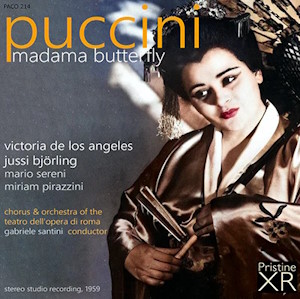
Giacomo Puccini (1858-1924)
Madama Butterfly (1904)
Cio-Cio San, Victoria de los Ángeles (soprano); Pinkerton, Jussi Björling (tenor); Sharpless, Mario Sereni (baritone); Suzuki, Miriam Pirazzini (mezzo-soprano)
Chorus and Orchestra of Rome Opera House/Gabriele Santini
rec. 1959, Rome Opera House, Rome, Italy
Pristine Audio PACO 214 [2 CDs: 137]
Madama Butterfly is one of those operas that doesn’t have many ‘perfect’ recordings. Many consider Callas’s 1955 recording (review) the most tragic and deeply felt interpretation and I see no need to disagree. Even so, she is not really a natural for Butterfly, having to lighten her voice considerably and, especially in the first act, making some rather ugly sounds because of that. The most characterful and idiomatic performance I have found, though ultimately maybe not as affecting as Callas’, is an early recording with Rosetta Pampanini as Cio-Cio San conducted by Lorenzo Molajoli. There we have what could be deemed an almost perfect recording of the work, thoroughly well-styled and committed – but it is in rather primitive mono sound.
Victoria de los Ángeles is a lovely Butterfly, not as deeply tragic as Callas or as characterful and well-sung as Pampanini, but she is sweet-voiced and affecting. Perhaps a little too demure for a character who is written with a certain amount of fire and backbone. Her vocalism is fine, but stronger on an earlier set conducted by Giandrea Gavazzeni (review). There, her vibrato is more consistent, whereas here it sometimes seems to skip a beat. Acid reflux maybe? Her conception of the character is thoughtful, but not overly specific or dramatic. Nevertheless, her sweet timbre and sympathetic way with the music is convincing and enjoyable.
The Pinkerton of Jussi Björling is again well-sung, but his voice is no longer as fresh as in earlier years and his vocal emission has frequent hints of nasality. The voice is of course a very lovely one, well projected and secure, but it is no longer completely fresh and the recorded sound is not really as lovely as it would have been in-house. Pristine has remedied this somewhat, but singers such as Alessandro Granda, Giuseppe Di Stefano and even Carlo Bergonzi seem more naturally suited to this music in their respective recordings.
Pirazzini and Sereni are very fine and round out a good if not quite exceptional cast that delivers a convincing and enjoyable performance. Santini’s conducting is well-paced, considerably slower than the lightening-quick Molajoli but faster than the slower reading of Karajan for Callas. Karajan’s second reading with Mirella Freni, a lovely but maybe-too-syrupy reading, is even slower.
This remastering by Pristine is excellent. The voices sound fuller and freer and the orchestral sound deeper and richer. The original stereo sound was fine, but this gives a more luxurious sound-picture and enhances the quality of the voices. Though there are recording which I prefer I would not hesitate to recommend this as a competitive version and for those who already know and enjoy this performance this remaster should be of great interest.
Morgan Burroughs
Previous review: Ralph Moore (June 2024)
Availability: Pristine Classical

















